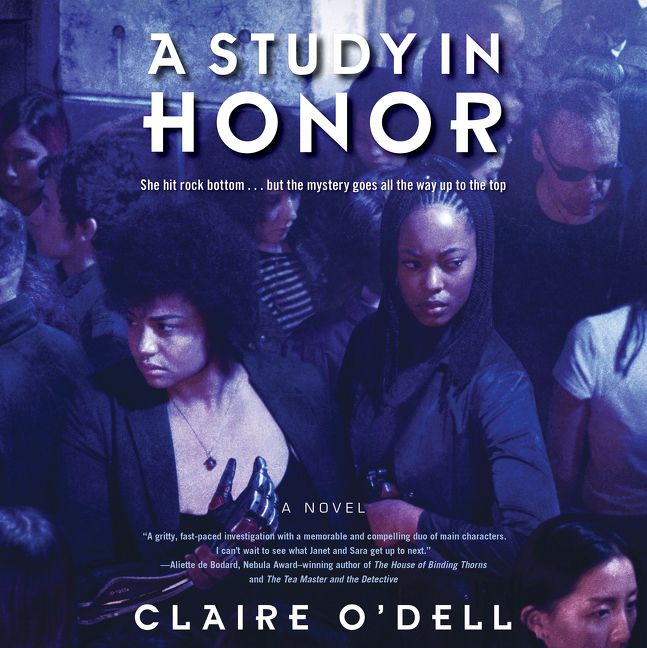Claire O’Dell’s A Study in Honor Reimagines Holmesian Canon
Sherlock and Watson are black lesbians in a dystopian, near future D.C. in this wonderful new interpretation of the Conan Doyle canon.
When I first claimed A Study in Honor for a review, I expected it to be focused primarily on the advertised Holmesian connection. Instead, Claire O’Dell takes Arthur Conan Doyle’s introduction of Holmes and Watson in A Study in Scarlet and turns it 270 degrees, setting the mystery in a dystopian near-future, where Dr. Janet Watson (who, like her namesake, was injured in war) becomes the roommate to Sara Holmes, a woman with mysterious clients and condescending habits.
Both women are African American (the book is set in Washington D.C.) and LGBTQA, and as the story opens, I suspected that the plot would closely follow the bones of Doyle’s original, with the conceits of the gender/race swapping giving the story its interest. But O’Dell does so much more than that, and the story rises above its references to become something new and captivating.
While Sherlock Holmes readers are sure to appreciate the nods (the realtor who shows Watson the apartment is Jenna Hudson, a reference to Holmes’s landlady Mrs. Hudson; a pivotal character late in the novel shares a last name with “the woman”), O’Dell’s interest seems to be delving more deeply into the character of her Watson than Doyle ever did.
While, in Doyle’s original works, Watson is the affable foil and recorder of the exploits of Holmes, O’Dell’s Watson returns from war suffering PTSD, and the novel is as much about Watson beginning to heal as it is solving the mysterious deaths of veterans—and bringing those responsible to justice.
Janet Watson’s World
In A Study in Honor‘s near-future setting, the United States is at war with itself. O’Dell’s world building seems to stem from the notions of “what if”: what if the United States is truly as divided right now, in the real world, as the media presents it? What if the Trump presidency has brought out so much viciousness and hatred for the other that those emotions can never be successfully be shoved back into the shadows? What if a progressive Latinx female wins the presidency?
In Janet Watson’s world, the answer is that white supremacists and the voices that ally with them form a true rebellion, breaking the United States into a second civil war that begins in Oklahoma, but stretches through the middle of the country. The New Confederacy takes what territory it can, and the movement expands quickly enough that celebrated surgeon Dr. Janet Watson feels compelled to serve. No one understands her decision: her parents worry, her grandmother openly criticizes her, her sister thinks she’s trying to take on the world, and her girlfriend leaves her.
And then comes Alton, Illinois, which changes everything again. It’s an unprecedented attack of the New Confederacy on the United States, and they successfully overrun U.S. territory. Watson is there to see the destruction. Watson is among those trying to get her patients to the safety of the helicopters—to get them out of the massacre. And as that’s happening, a sniper’s bullet shatters her arm. Despite the world’s technological advances, which would allow her to have a mechanical replacement equal to her own surgeon’s fingers, in the field, they’re only able to attach an outdated arm that has nowhere near the dexterity and handling her work requires.
Angry at the world, and left angry and frightened from the war, Watson takes her case to Washington D.C., where she once lived, and where now she hopes to make a case to the VA that she needs a suitable arm. Bureaucracies being what they are—and with an unpopular war losing funding—she’s able to extract only placations. Perhaps they’ll be able to get her an arm if she can wait long enough. Perhaps, but no promises. Watson takes a job as a VA medical technician, logging in patient data as they arrive to see the doctors, as a way to earn money while she waits.
Racial tensions run as high in Watson’s world as they feel in modern America, and her voice reveals how this feels in understated moments. At one point, when very dark-skinned Holmes shouts at a white-skinned hospital receptionist, Watson chronicles the response:
Her voice was too loud, too flat. The woman jumped in her seat. I sensed movement rippling throughout the reception area. The white people staring at us. The few blacks going still and tense as they stared anywhere but in our direction.
Watson’s awareness of the social dynamics of race and class—of how she is impacted by them, and of the choices she makes and doesn’t make because of the way the world still works, separating people first by pigmentation and further by culture—reads as a strong social commentary, and as a window for readers who have never had to think about how their skin color impacts the way the world treats them.
Claire O’Dell is a pseudonym for Beth Bernobich. Bernobich is not, herself, African American, so this is not an #OwnVoices novel in terms of race or, for that matter, disability. (From this straight, white, able-bodied reviewer’s perspective, it seems that she conducted extensive research to so convincingly write from both perspectives.) However, it is #OwnVoices for PTSD and bisexuality.

Enter Holmes
Watson’s inner life is fascinating, even without playing her against the very Holmesian Sara, whose superiority and cunning are a match for Doyle’s original, though her means and methods are different. Watson is tempted into becoming Holmes’s roommate because it gets her out of the miserable hostel in which she’s staying, and because, in all things, she is tempted by beauty. And it is good for Holmes that she recognizes Watson’s weakness, because Holmes makes herself insufferable.
She is imperious. She assumes her own way. She takes charge of situations without explaining herself and expects others to fall in line. There’s an implication that this is because she’s from a wealthy family—with whom she frequently disagrees, but who ultimately come through when she needs them. She’s hooked into all the latest tech: she wears cybernetic lace gloves and an earbud that give her access to an information cloud that puts the modern Internet to shame.
Holmes’s affluence is a thorn for Watson, though she initially does her best to ignore Holmes’s idiosyncrasies. When one of Watson’s patients dies—a woman suffering from similar PTSD to Watson’s own, whose sleeplessness and depression had her coming back for frequent appointments—Watson looks into the death, and finds herself suddenly targeted by a mugger on her way home from work.
Holmes locks Watson away from the world to recover from the attack (drawing Watson’s intense ire), and ultimately reveals a small bit about her work—as an intelligence agent of the federal government. Though Holmes is not authorized to investigate further, she partners with Watson, because the data refuses to line up, and Holmes sees connections that need more evidence before she can prove a conspiracy that threatens not only Watson, but the fate of the United States.
While Holmes never reveals the same kind of depth as Watson, there are hints of it there, as well as moments that show the impenetrable façade of her superiority hides a vulnerability. Holmes will strike readers as the kind of woman few people understand, and even fewer people befriend. Despite Watson’s initial dislike and fury toward her roommate, as the novel concludes, the two women are indeed friends and allies, and are well set up to complete further adventures.
The Holmes and Watson hook is a sure bet—there are enough spin-offs in mystery, film, and SFF for marketers to know that those names are an obvious draw. But, while you may come for the hook, stay for O’Dell’s characters, who are fully realized in their own right. Come for her world, a frightening and all-too-possible feeling dystopia. And come for the hope that, even when all the world seems unfair, there are people who fight for justice—and who find it, a little at a time.
Read A Study in Honor by Claire O’Dell
For more speculative fiction suggestions, check out our picks for the Best Science Fiction Books of July 2018 and the Best Fantasy Books of July 2018.
